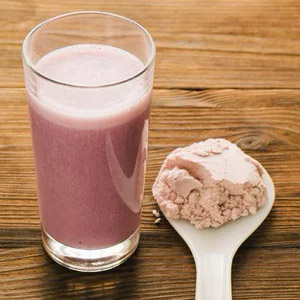Collagen supplements are becoming increasingly popular. Here’s what Jessica Oosthuizen, a registered dietitian, has to say about the trend.
If you pay attention to what health bloggers and influencers post online, you might have noticed the increasing collagen trend. Whether in powder or liquid form, it’s being added to everything. Big skincare brands are also boasting about the properties of collagen added to their moisturisers and serums.
The claims about collagen are too fantastic to ignore, but what do the dietitians say?
What is collagen?
Collagen is a major structural protein that acts as a building block for bones, teeth, muscles, tendons, ligaments, skin, and all other connective tissues. It also plays a vital role in wound healing and in immune function.
Collagen is the most abundant protein found in the human body. It is, however, not a complete protein, which means it doesn’t contain adequate amounts of all of the nine essential amino acids your body needs.
Collagen goes commercial
Products containing collagen include serums, creams, powders, tablets and drinks to name only a few. Further, bloggers are blending it into smoothies, breakfast oats, baking with it and even having it as a shot. Supplements are usually advertised as containing collagen peptides, meaning the protein has been broken down into shorter chains of amino acids as this is easier for your body to digest.
There are numerous types of collagen that are made up of different peptides that have varying structures and functions. It’s important to know that currently there is minimal evidence to indicate which type may be the most beneficial.
Collagen and its effect on the skin
There is no doubt that collagen contributes to the firmness and elasticity of our skin. As we age, collagen production declines and this can contribute to wrinkles, dry skin and fine lines. It is said that after 25 years of age we start to break down more collagen than we make, which will eventually lead to signs of ageing. Additional factors that contribute to depleting collagen levels include smoking, sun exposure, and a nutrient-poor diet high in refined starches and sugars. All of these activate enzymes that degrade collagen fibres.
Although some studies have shown benefits such as increasing skin elasticity and moisture when taking collagen supplements, they were flawed. Information bias was present as the studies claiming these benefits were sponsored by the companies who manufacture the products.
Other studies that have been done were in vitro (done in a test tube), used small sample sizes or were not done on humans. We therefore cannot claim that taking a collagen supplement will improve skin health. Very few studies have also evaluated the benefits of collagen used in a serum. The reason for doubt is that most collagen molecules are too large to be absorbed by the skin.
Collagen and bone health
As we age, moving our bodies becomes more difficult, with swollen joints, inflammation and stiffness. Collagen plays a role in the functioning of connective tissues, which suggests that maintaining healthy collagen levels is essential to maintain mobility and body strength. Some studies have found that collagen supplementation decreases pain in patients with osteoarthritis and rheumatoid arthritis, although the exact mechanism is not clearly understood.
This might, however, be related to a reduction in inflammation rather than an increase in endogenous collagen. Other studies have evaluated the effect of collagen supplementation in athletes, and improvements in joint pain have been found. However, once again these studies were done with small sample sizes and, due to other limitations, future studies are needed to back up the evidence.
Keep or toss the supplements?
Currently we are unable to positively identify collagen as the sole reason for skin-improving benefits – part of the problem being that we don’t know for sure if the skin is able to absorb the collagen found in serums and creams. In terms of bone health, practitioners will, however, recommend supplementing with hydrolysed collagen if you are prone to injuries. In addition, we should also adopt a holistic approach to bone health by following a healthy diet combined with regular exercise.
How to increase collagen naturally
Optimal nutrition is a key factor to help your body produce its own collagen. Essentially you should aim to eat a variety of wholesome unprocessed foods rich in protein, phytonutrients, vitamins and minerals with special reference to calcium, magnesium and Vitamin D. Also practise strategies for decreasing stress, avoiding excessive sun exposure, quitting smoking and getting enough sleep.
While bone broth is naturally high in collagen, the following food sources are high in amino acids that support collagen growth:
- Eggs
- Poultry
- Pork
- Meat off-cuts (tripe, oxtail and knuckle)
- Fish
- Dairy
Considering there are many different types of collagen, it’s advisable to get your collagen from a variety of sources. Certain nutrients such as vitamin C and anthocyanidins improve the formation and absorption of collagen. We find them in red and green pepper, orange, grapefruit, broccoli, raspberries, cranberries, strawberries, pomegranates, kidney beans, beets and goji berries.
In need of a dietitian for individual help? Visit Nutritional Solutions.
Source: https://www.health24.com/Diet-and-nutrition/Dieet/are-collagen-supplements-worth-the-hype-20190204









